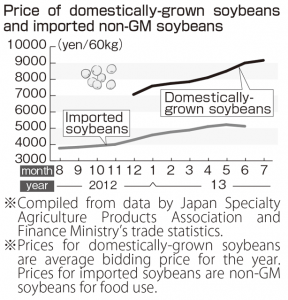Kazuhiro Takamatsu
Japanese trading firms are having difficulty coping with supply shortage of imported non-GM soybeans which Japanese consumers prefer. Production of non-GM soybeans are declining, as the bad weather and increase of demand in emerging markets are pushing up soybean prices in the global market, prompting farmers to move away from time-consuming production of non-GM soybeans. Soybean dealers, also hit by the weakening yen leading to rising prices of imports, are turning to domestically-produced soybeans and are calling on the government to take measures to encourage soybean production.
An official of a major Japanese trading company which imports non-GM soybeans from the United States and Canada says all the non-GM soybeans to be harvested this year are already under purchase contracts, and it is almost impossible to make new purchase arrangements.
According to statistics by the Canadian Soybean Council, the total soybean production in Canada rose 690,000 tons from the previous year to 4.92 million tons. Meanwhile, production of non-GM soybeans dropped 370,000 tons from a year before to 1.09 million tons. As a result, the percentage of non-GM products decreased largely from 34.7 percent of total production in 2011 to 22.2 percent in 2012.
The drop in production of non-GM soybeans is due to the recent rise in the prices of soybeans in the international market. In the Chicago Board of Trade, soybeans were traded at around 10 dollars per bushel (27.2 kg) in 2010, but the prices rose at one time to as high as 18 dollars in 2012. Currently, they are traded at around 14 dollars.
Producers of non-GM crops are provided with premiums since such crops have lower yields and are more time-consuming than GM crops. Although the premiums have increased along with the rising prices in the market, many farmers consider it will be more beneficial for their businesses to produce GM crops, according to an official of a major trading firm.
Despite the declining supply, demand for non-GM products is increasing in the U.S. and Europe, backed by expanding public awareness towards food safety. Whole Foods Market, a major supermarket chain in the U.S., announced in March that by 2018, all the products in its stores will be labeled to indicate whether they contain GM ingredients. Many states are also considering their own mandatory GM labeling laws.
Production of non-GM soybeans remains flat in the U.S., but an official of a Japanese trading company explains that it is difficult to increase purchase from the U.S., as competition among importing countries is intensifying while U.S. firms are putting priority on responding to increasing demand in the domestic market.
Some Japanese importers are turning to other countries for supply of non-GM soybeans. Major trading firm Mitsui & Co. produces 60,000 tons of non-GM soybeans annually in its plant in Brazil. Currently, the products are mainly used to extract oil, but the company is considering whether they can import them for food use.
Demand for domestically-grown soybeans is growing as well. Bidding prices for soybeans harvested in 2012 continued to rise, marking 9,165 yen per 60 kg in the last bid conducted in July, more than 2,000 yen higher than two years before.
Since it is difficult to increase imports, wholesalers hope for increase in domestic production, but the expected acreage of soybeans for 2013 is around 106,000 hectares, down 5 percent from 2011. This is because the current individual household income compensation program offers higher subsidies to farmers who grow rice for animal feed or for stockpiling.
Producers’ associations are calling for revision of the program to encourage farmers to choose soybeans when they change crops.
(Sept. 3, 2013)


